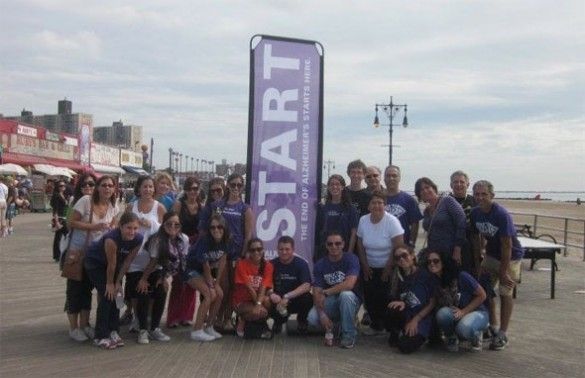November Is Alzheimer’s Awareness Month; Here Is A Local’s Take

The following was submitted by Jeanine Grimaldi, a Sheepshead Bay resident whose family wrestles with the effects of Alzheimer’s every day.
November starts Alzheimer’s Awareness month, a disease that affects more than 5.4 million people, including more than 320,000 individuals over the age of 65 in New York State alone. This issue is important to me because my grandmother Mary, a longtime Sheepshead Bay resident, has been fighting Alzheimer’s disease for the past 10 years. She does not remember my name, but when I take her near the water in Sheepshead Bay she tells me she remembers coming here all the time when she was a little girl. Through caring for my grandmother and spending time learning about Alzheimer’s, I know that we have a lot of work to do to help Alzheimer’s patients and their families.
Most people equate memory loss with Alzheimer’s, but it’s so much more than that. Eventually, individuals with Alzheimer’s will have impaired judgment, feel disoriented and confused and have difficulty speaking. Behavioral changes also occur, causing your loved one to act in ways that are out of the norm for his or her personality. During the later stages, chewing, swallowing and walking can become difficult.
Alzheimer’s is the sixth leading cause of death in the United States. It is the only disease in the top 10 that cannot be prevented, cured or even slowed down. Government funding for Alzheimer’s research is also woefully underfunded. While other top 10 killers like cancer receive nearly $6 billion in Alzheimer’s funding, and HIV/AIDS receives around $3 billion dollars, Alzheimer’s disease receives only $450 million.
We are at a historic crossroads with Alzheimer’s disease. In January 2011, President Obama signed the National Alzheimer’s Project Act (NAPA) into law. The law requires the government to create a national strategic plan to combat this escalating epidemic.
In addition to NAPA, there are two other Alzheimer’s-related bills that can help to change the trajectory of the disease. The first is the Alzheimer’s Breakthrough Act, which would ensure a commitment to Alzheimer’s research, and the second is the Health Outcomes, Planning, and Education – or HOPE – Act, which would help to improve the diagnosis and early detection of Alzheimer’s and ensure those who are diagnosed have access to care planning services. You can find more information on these bills or statistics here.
Your voice is needed to make Alzheimer’s a national priority. These bills will not get passed without the collaboration of the people affected by this horrible disease. Ask your member of Congress to join the Bipartisan Congressional Task Force on Alzheimer’s disease and sponsor the HOPE for Alzheimer’s Act and the Alzheimer’s Breakthrough Act. It will push legislators to give Alzheimer’s more funding and provide better care services.
With the aging of the baby boomers, a population that our area has a high percentage of, Alzheimer’s is affecting more and more families. If you are interested in learning more about Alzheimer’s disease or if you need resources for a member in your family, please visit alznyc.org. You can also contact Congressman Turner to urge him to join in the fight against Alzheimer’s disease by visiting here. If you are not in the 9
thdistrict, you can look up your district’s legislators here.
Recently, the 3
rdAnnual Walk to End Alzheimer’s took place on the Coney Island Boardwalk on September 25. This event is fairly new to our community, but attendance doubled from last year and over $50,000 dollars was raised. The Alzheimer’s Association hopes that the Brooklyn walk will continue to grow, and will be planning another walk for fall 2012.



